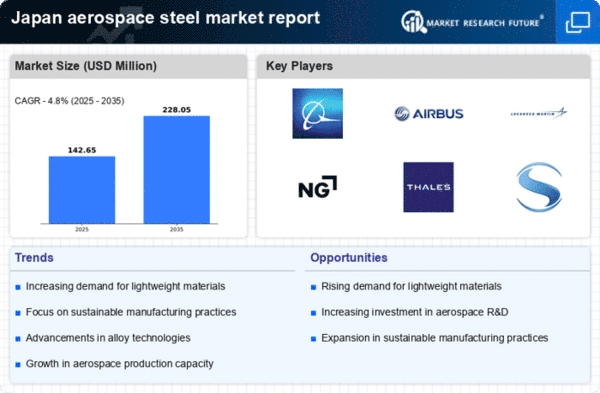The aerospace steel market in Japan is characterized by a competitive landscape that is increasingly shaped by innovation, strategic partnerships, and a focus on sustainability. Key players such as Boeing (US), Airbus (FR), and Nippon Steel Corporation (JP) are actively engaged in enhancing their operational capabilities to meet the evolving demands of the aerospace sector. Boeing (US) has been focusing on digital transformation initiatives, which aim to streamline production processes and improve supply chain efficiency. Meanwhile, Airbus (FR) is leveraging its strong position in the market to foster collaborations with local suppliers, thereby enhancing its regional footprint and ensuring a more resilient supply chain. Nippon Steel Corporation (JP) is also making strides in sustainability, emphasizing the development of high-strength steel products that align with the industry's shift towards greener technologies.In terms of business tactics, companies are increasingly localizing manufacturing to reduce lead times and optimize supply chains. The market structure appears moderately fragmented, with several key players exerting influence over their respective segments. This fragmentation allows for a diverse range of offerings, but it also necessitates that companies remain agile and responsive to market changes. The collective influence of these major players shapes the competitive dynamics, as they vie for market share through innovation and strategic positioning.
In October Boeing (US) announced a partnership with a leading Japanese technology firm to develop advanced manufacturing techniques aimed at reducing production costs and enhancing product quality. This collaboration is expected to leverage cutting-edge technologies such as AI and machine learning, which could significantly improve Boeing's operational efficiency in the region. The strategic importance of this partnership lies in its potential to bolster Boeing's competitive edge in the Japanese market, where precision and quality are paramount.
In September Airbus (FR) unveiled a new initiative focused on the development of lightweight aerospace steel alloys, which are designed to improve fuel efficiency in aircraft. This move not only aligns with global sustainability goals but also positions Airbus as a leader in innovative materials within the aerospace sector. The introduction of these alloys could potentially reshape aircraft design and manufacturing processes, offering Airbus a distinct advantage over competitors.
In August Nippon Steel Corporation (JP) launched a new line of high-strength steel products specifically tailored for aerospace applications. This strategic move is indicative of Nippon Steel's commitment to meeting the increasing demand for advanced materials that enhance aircraft performance. By focusing on high-strength solutions, Nippon Steel is likely to capture a larger share of the market, particularly as manufacturers seek to improve the efficiency and sustainability of their fleets.
As of November the competitive trends in the aerospace steel market are increasingly defined by digitalization, sustainability, and the integration of AI technologies. Strategic alliances are becoming more prevalent, as companies recognize the need to collaborate in order to innovate and remain competitive. The shift from price-based competition to a focus on technological advancement and supply chain reliability is evident, suggesting that future differentiation will hinge on the ability to innovate and adapt to changing market conditions.
















